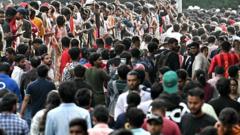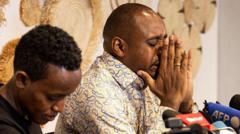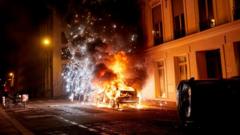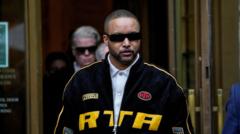Nakuru becomes the focus of unrest as police crack down on students gearing up for a polarizing performance that mirrors recent national protests.
Tensions Erupt at Kenya's National Drama Competition Amid Police Action
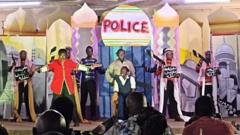
Tensions Erupt at Kenya's National Drama Competition Amid Police Action
Police disperse crowds with tear gas as students protest detention of play's author.
Kenya's national high-school drama competition was marred by chaos when police utilized tear gas to disperse crowds in Nakuru, gathered to witness "Echoes of War," a controversial play that delves into the disillusionment of youth with their leaders. This fictional narrative resonates with the nationwide protests last year against tax increases, hence drawing considerable attention and sparking tensions.
The play was initially disqualified under unclear circumstances, but a High Court intervention mandated its inclusion in the competition. On Thursday morning, dissent escalated when students from Butere Girls School walked out of the venue, demanding the release of the play's author, Cleophas Malala, a former senator who had been detained by police just before the performances were set to begin.
After being released without charge, Malala commended the students for their boycotting efforts, framing their actions as courageous. "The young girls of Butere Girls' have exercised an act of heroic restoration," he declared, expressing a strong desire for the play to be performed.
Feelings of discontent were palpable as students expressed frustration over police pressure, with one participant questioning, "There's no audience. Who are we performing for?" Students also took the opportunity to sing the national anthem in defiance of the situation as police sealed off the theater area.
In the aftermath, Education Minister Julius Ogamba raised concerns regarding Malala's role in the competition, suggesting that a politician should not be involved in student performances. Interior Minister Kipchumba Murkomen similarly warned against politicizing educational events, emphasizing the need for a distinct separation between political motives and school activities.
Amid widespread public backlash, human rights organization Amnesty International raised alarms about increasing state-sanctioned repression of freedoms, including expression and assembly. Chief Justice Martha Koome condemned the violation of the court's order allowing Malala and his work to participate in the event, pointing out that defying judicial commands undermines the rule of law.
Prominent opposition leader Kalonzo Musyoka criticized police actions towards students, commending their brave stance against the imposed injustices. In solidarity with the students, the opposition Orange Democratic Movement (ODM) called for the play to be performed like any other competition entry, further highlighting the clash between art, politics, and authorities in Kenya.
The play was initially disqualified under unclear circumstances, but a High Court intervention mandated its inclusion in the competition. On Thursday morning, dissent escalated when students from Butere Girls School walked out of the venue, demanding the release of the play's author, Cleophas Malala, a former senator who had been detained by police just before the performances were set to begin.
After being released without charge, Malala commended the students for their boycotting efforts, framing their actions as courageous. "The young girls of Butere Girls' have exercised an act of heroic restoration," he declared, expressing a strong desire for the play to be performed.
Feelings of discontent were palpable as students expressed frustration over police pressure, with one participant questioning, "There's no audience. Who are we performing for?" Students also took the opportunity to sing the national anthem in defiance of the situation as police sealed off the theater area.
In the aftermath, Education Minister Julius Ogamba raised concerns regarding Malala's role in the competition, suggesting that a politician should not be involved in student performances. Interior Minister Kipchumba Murkomen similarly warned against politicizing educational events, emphasizing the need for a distinct separation between political motives and school activities.
Amid widespread public backlash, human rights organization Amnesty International raised alarms about increasing state-sanctioned repression of freedoms, including expression and assembly. Chief Justice Martha Koome condemned the violation of the court's order allowing Malala and his work to participate in the event, pointing out that defying judicial commands undermines the rule of law.
Prominent opposition leader Kalonzo Musyoka criticized police actions towards students, commending their brave stance against the imposed injustices. In solidarity with the students, the opposition Orange Democratic Movement (ODM) called for the play to be performed like any other competition entry, further highlighting the clash between art, politics, and authorities in Kenya.






